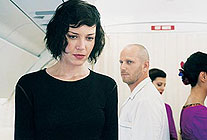|
|
|
|
Demonlover
|
 |
|
Olivier Assayas is one of those contemporary directors better known for his interviews than his films. (This has something to do with the fact that, as an ex-critic, he gives good talk.) In Australia, we have barely seen anything he has made before or since the dazzling Irma Vep (1996). Demonlover, which loosely sits in the cyberpunk genre, finally surfaced here two and a half years after its Cannes debut. Not long after, the ever-restless Assayas made another feature (Clean, 2004) and once again reinvented his style. Demonlover bears some resemblance to Irma Vep. Both movies explore a busy, very modern visual texture. Like Michael Mann's Collateral (2004), everything here is caught in movement and reflected in glass, a testament to the fragmentation and ephemerality of a hi-tech, ruthlessly corporatised world. Common to both Demonlover and Irma Vep is a veritable Babel of languages: French, English, Japanese. Assayas plunges us into the unreal atmosphere of one such corporation and its power games. Diane (Connie Nielsen) is in the middle of a scam involving the rights to an Internet site broadcasting extreme Japanese anime – and perhaps even snuff movies. She is in a constant tussle with her boss, Hervé (a creepy Charles Berling) and ambitious assistant, Elise (Chloe Sevigny). A cameo from Gina Gershon briefly kicks proceedings into a wonderfully trashy key. Assayas has set himself a difficult task here. He begins the film as a relatively conventional mystery-thriller (the skulduggery during the opening plane sequence is a highlight), but then wants us to forget the narrative intrigue and place our attention elsewhere – especially on the social critique of globalisation and its ills. A genre film that deconstructs itself before our eyes can easily leave the audience feeling cheated or dissatisfied, and Demonlover hits this problem long before the final scene. But Assayas is a remarkable stylist and, as a pure aesthetic object, Demonlover is quite a feast. Denis Lenoir's widescreen cinematography creates a mood so thick it often smothers the deliberately shaky and confusing plot. The ambient score by Sonic Youth (already sampled to such terrific effect in Irma Vep) meshes seamlessly with Assayas' intricate soundscape of strange noises – to the point where it is impossible to tell where music ends and sound effects begin. Champions of this film argue that Assayas' vision (like that of his hero, David Cronenberg) is ambiguous, perverse, amoral. For me, the film's attitude is altogether too clear and clean. He creates a cold world full of alienated people, and then condemns its coldness and alienation. This is ultimately a rigged, hyper-cerebral game – and the appeals by Assayas to "diving into the unconscious" mid-way through the plot only point up the rationalist short-circuit of such a carefully-laid and mimicked strategy. However, if you need a movie to sharpen your senses, Demonlover is worth trying. MORE Assayas: Cold Water, Irma Vep TV SERIES © Adrian Martin October 2004 |
![]()